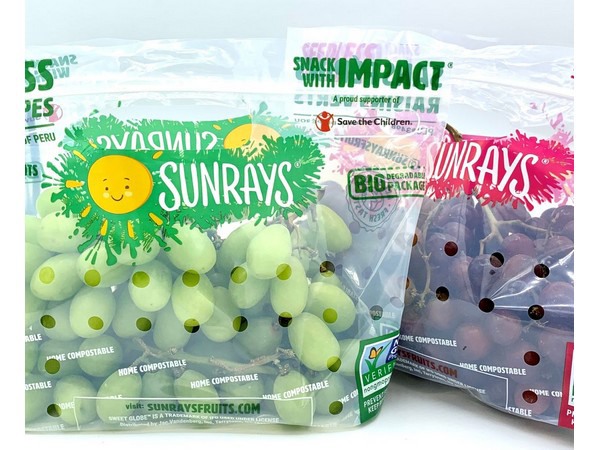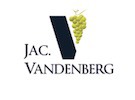SUNRAYS® grape BIO bags, the home compostable grape bags, have arrived.
New York-based fresh produce importer and distributor Jac. Vandenberg Inc. has introduced sustainable packaging for its SUNRAYS products. Vandenberg has already been working in the area of sustainable packaging innovations: last year, Vandenberg’s citrus BIO bags won BNCW Magazine’s 2021 Eco-Excellence Award™ in the Snack Category.
The BIO bags are developed and produced by an Israeli-based company, TIPA®. The company provides fully compostable packaging designed to break down within months under compost conditions, just like any organic matter. The bags are made from 20 percent bio-based plastic (derived from non-GMO corn sand sugar cane) and 80 percent fully compostable fossil-based polymers. With an active and healthy compost heap, these bags will disintegrate within six months.
 The BIO bags are made from 20 percent bio-based plastic (derived from non-GMO corn sand sugar cane) and 80 percent fully compostable fossil-based polymers.
The BIO bags are made from 20 percent bio-based plastic (derived from non-GMO corn sand sugar cane) and 80 percent fully compostable fossil-based polymers.
“We are all too aware of the problems with traditional plastic packaging. So it is critical we begin to move away from this material,” says John Paap, brand manager at Jac Vandenberg. “In our BIO bags we have a solution that offers something that looks and feels like traditional plastic but will biodegrade in compost, just like the fruit inside it. We are confident these bags will help retailers achieve their targets set around zero waste, plastic reduction and overall sustainability.”
Late last year at COP26, the US and the EU announced a global partnership to cut the emission of the greenhouse gas methane by 2030. Although there’s more CO2 in the atmosphere, methane is over 80 times more potent. That’s where composting comes in. Composting is a process where living organisms break down organic matter into compost or rich soil.
“By composting we can make a significant impact on global warming and create nutrient-rich compost soils,” said Paap. “One major source of methane emissions come from our trash. The average household trash contains around 35 percent organic waste, which could be composted. However, this trash gets moved to a landfill which degrades without oxygen and this process generates methane. By composting organic waste, we can significantly reduce methane emissions.”
These bags also tackle plastic waste as there are no micro-plastics (or any plastics of any kind) left behind once the package has biodegraded.
Later this year, Vandenberg will launch an interactive page on its SUNRAYS website on the hows of composting to educate consumers. Consumers will be able to access this page via a QR code on the bags or by visiting the SUNRAYS website.
The SUNRAYS grape BIO bags will be available in limited supply this winter.
 For more information:
For more information:
John Paap
Jac. Vandenberg, Inc.
Tel: 914-964-5900
[email protected]
www.jacvandenberg.com
